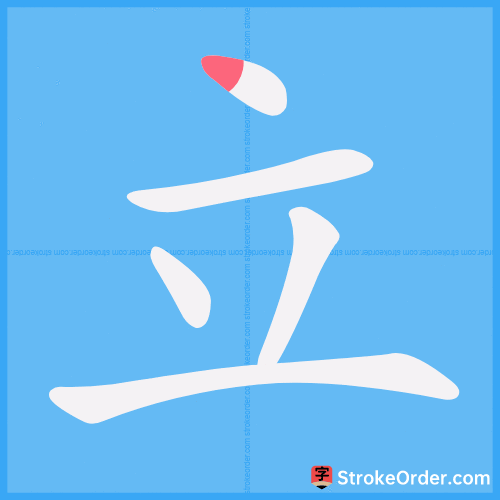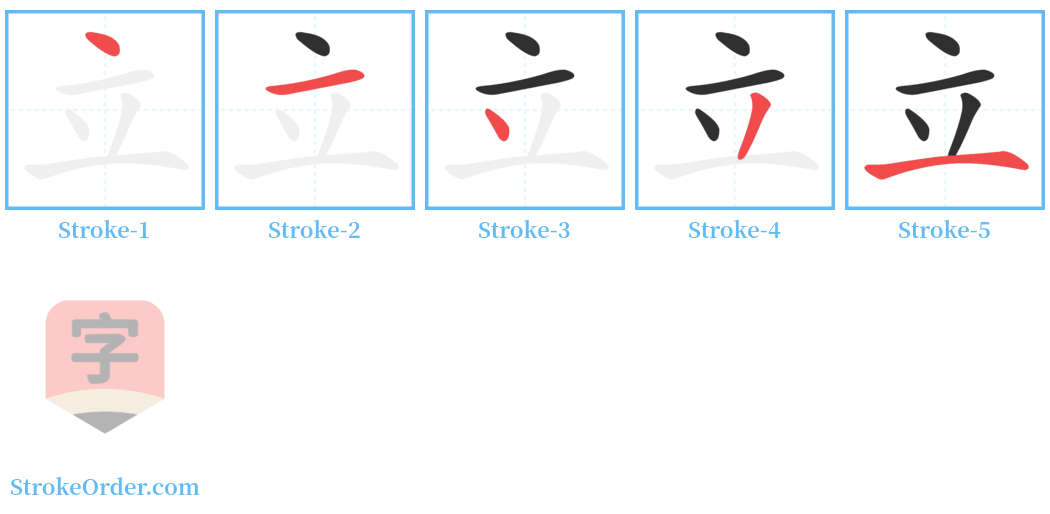立 Stroke Order
Animated Stroke Order of 立

Stroke Order Diagrams for 立

Step-by-Step Handwriting Guide for 立

Learn to Write Chinese Characters with Video Tutorials
Watch the video of writing the Chinese character "立", learn the correct stroke order (笔顺) of the character "立", and master the standard way of writing the character "立".
Free Printable Handwriting Practice with Stroke Order: 立
Printable Writing Practice Worksheet of "立" in Portrait Orientation (Tian Zi Ge)

Printable Writing Practice Worksheet of "立" in Landscape Orientation (Tian Zi Ge)

Information of 立
Pinyin
lì
Radical
立
Strokes
5 strokes
Usage
★★★★★
Definition
set up / to stand
立 (lì)
[Verb], [Noun]
【Original meaning】: To stand upright
【Character creation method】: Pictophonetic. The oracle bone script resembles a person standing upright.
1. To stand: This is the original meaning.
- Examples: 立正 (stand at attention), 立柜 (standing cabinet), 立足 (① to stand firm; ② to be in a certain position), 立场 (position), 屹立 (to stand tall), 顶天立地 (to stand upright).
2. To set up, to establish:
- Examples: 建立 (to establish), 设立 (to set up), 树立 (to erect), 立意 (to establish intention), 立此存照 (to establish this record).
3. To exist, to subsist:
- Examples: 自立 (to be self-reliant), 独立 (independent), 势不两立 (cannot coexist).
4. Immediately, at once:
- Examples: 立时 (immediately), 立刻 (instantly), 立等 (waiting immediately).
5. Surname.
--------------------------------------------
立 (lì)
[Adverb]
1. Immediately, at once:
- Example: 立时 (immediately)
--------------------------------------------
立 (lì)
[Verb], [Noun]
【Original meaning】: To stand upright
【Character creation method】: Pictophonetic. The oracle bone script resembles a person standing upright.
1. Same as original meaning ([En.] stand).
【Extension】
- 1. 《说文》: 立, 侸也.
- 2. 《易·恒》: 君子以立不易方.
- 3. 《史记·项羽本纪》: 哙遂入,披帷西乡立.
- 4. 《史记·廉颇蔺相如列传》: 持璧却立.
- 5. 《韩非子·喻老》: 立有间.
- 6. 宋· 欧阳修《归田来》: 卖油翁释担而立.
- 7. 清· 薛福成《观巴黎油画记》: 或立或卧.
【Examples】
- 典如: 挺立 (stand straight), 坐立不安 (restless), 把电线杆立起来 (set up a utility pole), 肃立 (to stand solemnly), 立托 (to rely on), 立容 (posture when standing), 立戟 (guard standing with a spear), 立谈 (stop to converse).
2. Erect; to establish; to raise:
- Examples: 立事 (to achieve), 立方 (to confer virtue), 立言 (to declare thoughts in writing), 立业 (to build a career), 立勋 (to establish merit), 立石 (to erect a monument), 立权 (to establish authority), 立眉瞪眼 (to raise eyebrows and glare), 立德 (to build virtue), 立德立言 (Confucians believe in establishing virtue and expressing wisdom to rectify the world), 立碑垂成 (engraving on a monument for guidance).
3. To set up; to establish:
- Examples: 立元 (to establish a reign), 立仗 (to establish a ceremonial guard), 立本 (to set a foundation), 立表下漏 (to create sundials for time tracking), 立事 (to appoint minor officials), 立制 (to establish a system).
4. To lay down; to conclude:
- Examples: 立文书 (to draft a document), 立军令状 (to draw up a military order), 立券 (to make a contract), 立格 (to set standards).
5. To define; to decide:
- Examples: 立限 (to set a deadline), 立计 (to determine plans), 立报 (to aspire), 立愿 (to make pledges), 立语,立说 (to make assertions).
6. To exist; to subsist:
- Examples: 立命 (to cultivate to live up to the mandate of heaven), 立品 (to cultivate virtue), 立行 (to establish moral conduct), 立计 (to pursue a career), 立身 (to conduct oneself in society).
7. To conduct oneself in society; to have a foothold:
- Examples: 立势 (to present oneself in an excellent manner), 立士 (to be self-sufficient in society), 立行 (to conduct oneself), 立脚 (to establish oneself).
8. To be enthroned; to ascend to the throne:
- Examples: 立子 (to appoint an heir), 立君 (to establish a monarch), 立政 (to determine political principles), 立朝 (to be in power), 立极 (to ascend to a throne).
9. To establish a certain status:
- Examples: 立人 (to foster individuals), 立王 (to establish a king), 立后 (to appoint a queen), 立朝 (to hold office), 立储 (to name an heir).
10. To recommend:
- Example: 立主 (to strongly advocate).
11. To become an official:
- Example: 立班 (to attend court according to rank).
12. To manifest, to reveal oneself:
- Example: 立挣 (to appear dazed).
13. To stop; to stay:
- Example: 立车 (to stop a vehicle), 立定 (to stand still).
14. To arrive; to be present:
- Example: 立事者贱者劳而贵者逸.
15. To eat:
- Example: 立后而手实.
【Noun】
Also means “position” or “ranking” in matters of nobility.
【Examples from literature】
- 1. 《商君书·更法》: 代立不忘社稷.
--------------------------------------------
立 (lì)
[Adverb]
1. Immediately, at once:
- Examples: 立时 (immediately), 立定 (right away), 立马造桥 (to act immediately), 立成 (to finish at once), 立便 (at once).
to oppose / to set sth against / to be antagonistic to / antithetical / relative opposite / opposing / diametrical
to stand tall and rock-solid (idiom) / towering majestically / (of a person) to stand up against sb
independent and autonomous (idiom); self-determination / to act independently / to maintain control over one's own affairs
Input Method for 立
Pinyin
li4
Wubi
uuuu
Cangjie
yt
Zhengma
su
Four Corner
00108
Unicode
U+7acb
Same Pronunciation Characters